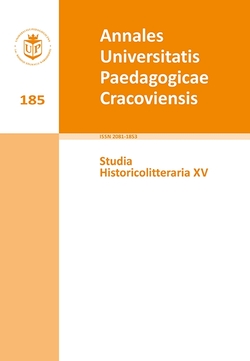Czas wyboru. O „Morfinie” Szczepana Twardocha
Main Article Content
Abstract
Days of Choice. About Morfina (Morphine) by Szczepan Twardoch
The purpose of this article is to show the way of presenting the national identity issues, which are present in the Morphine by Szczepan Twardoch. The unclear situation of main character is a starting point of my reflections. He is situated between Polishness and Germanness, femininity and masculinity, being active and being passive. In my analysis I concentrate on patterns into which the main character cannot (or perhaps does not want to) be written, and which have theirs roots in Polish national myths and stereotypes.
Key words: Morphine; identity; collective memory; narrative identity; romanticism;
Downloads
Article Details

This work is licensed under a Creative Commons Attribution-NonCommercial-NoDerivatives 4.0 International License.
COPYRIGHT POLICY
The publisher of "Annales Universitatis Paedagogicae Cracoviensis.Studia Historicolitteraria" is authorised to use and distribute all the materials published in the journal on the basis of a non-exclusive licence agreement unlimited in time – previously concluded for an indefinite period of time each time with the author of a specific paper in the fields of exploitation specified in the agreement.
OPEN ACCESS POLICY
"Annales Universitatis Paedagogicae Cracoviensis.Studia Historicolitteraria” is an open access journal, and all its contents are available for free to users and/or their institutions on the basis of non-exclusive licenses under Creative Commons (CC BY CC-BY-4.0). Users can read, download, make copies, distribute, print, search, or to link to full text articles in this journal without the prior permission of the publisher or the author.This is consistent with the definition of open access BOAI (http://www.soros.org/openaccess).
References
Assmann A., Między historią a pamięcią. Antologia, Warszawa 2013.
Bauman Z., Ponowoczesność jako źródło cierpień, Warszawa 2000.
Bielik-Robson A., „Morfina”, albo psychoanaliza polskości, „Krytyka Polityczna. Dziennik Opinii”, www.krytykapolityczna.pl/felietony/20130106/morfina-albo-psychoanaliza-polskosci [dostęp: 10.10.2014].
Gombrowicz W., Transatlantyk. Ślub, Warszawa 1967.
Jarzębski J., Pojęcie „formy” u Gombrowicza, [w:] Gombrowicz i krytycy, red. Z. Łapiński, Kraków 1984.
Jestem tym, kim jestem, „Książki. Polter.pl”, ksiazki.polter.pl/Morfina-Szczepan-Twardoch-c25203 [dostęp: 1212.2014].
Nowacki D., Narodziny gwiazdy (Szczepan Twardoch), [w:] tegoż, Ukosem. Szkice o prozie, Katowice 2013.
Osuch J., O tragicznym statusie jednostki ludzkiej, „Vertigo. Pismo Studenckich Kół Naukowych Uniwersytetu Marii Curie-Skłodowskiej w Lublinie”, vertigoumcs.wordpress.com/2013/12/02/o-tragicznym-statusie-jednostki-ludzkiej/ [dostęp: 12.12.2014].
Tomczak-Tomaszewska K., Niezdrowy urok Konstantego Willemanna, „LITERATKI. W stronę książki”, literatki.com/8266/szczepan-twardoch-morfina-niezdrowy-urok-konstantego-willemanna [dostęp: 10.01.2015].
Twardoch S., Morfina, Warszawa 2012.
Twardoch S., Perfekcyjny brak tożsamości, rozm. przepr. D. Wodecka, [w:] D. Wodecka, Polonez na polu minowym, Warszawa 2013.
Twardoch S., Tożsamość samotna, „Znak. Miesięcznik” 2012, nr 680.
Twardoch S., Wieczny Grunwald, Kraków 2013.
Szczepan Twardoch „Morfina”, spot reklamowy Wydawnictwa Literackiego, www.youtube.com/watch?v=YI5Gbxrrw4E [dostęp: 9.10.2014].
